Analysis of Director's Duties and Legal Responsibilities: Report
VerifiedAdded on 2023/01/17
|9
|1402
|82
Report
AI Summary
This report provides a detailed examination of director duties, as codified in the Companies Act 2006. It defines the role of a director, emphasizing their responsibilities in managing company affairs and making strategic decisions. The report outlines the legal framework, including key sections such as s 175(1), which addresses conflicts of interest, and s 175(2), concerning corporate opportunities. It explores director liability, the corporate opportunity doctrine, and the provisions of s 175(4) regarding relief from liability. Furthermore, the report illustrates conflicts of interest through examples like multiple directorships and personal interests. It includes an explanation of ratification and analyzes relevant case law, such as Regal (Hastings) Ltd v Gulliver, Cook v Deeks, CMS Dolphin v Simonet, and Bhullar v Bhullar, to illustrate the practical application of director duties. The report concludes by referencing key academic sources that support the analysis.
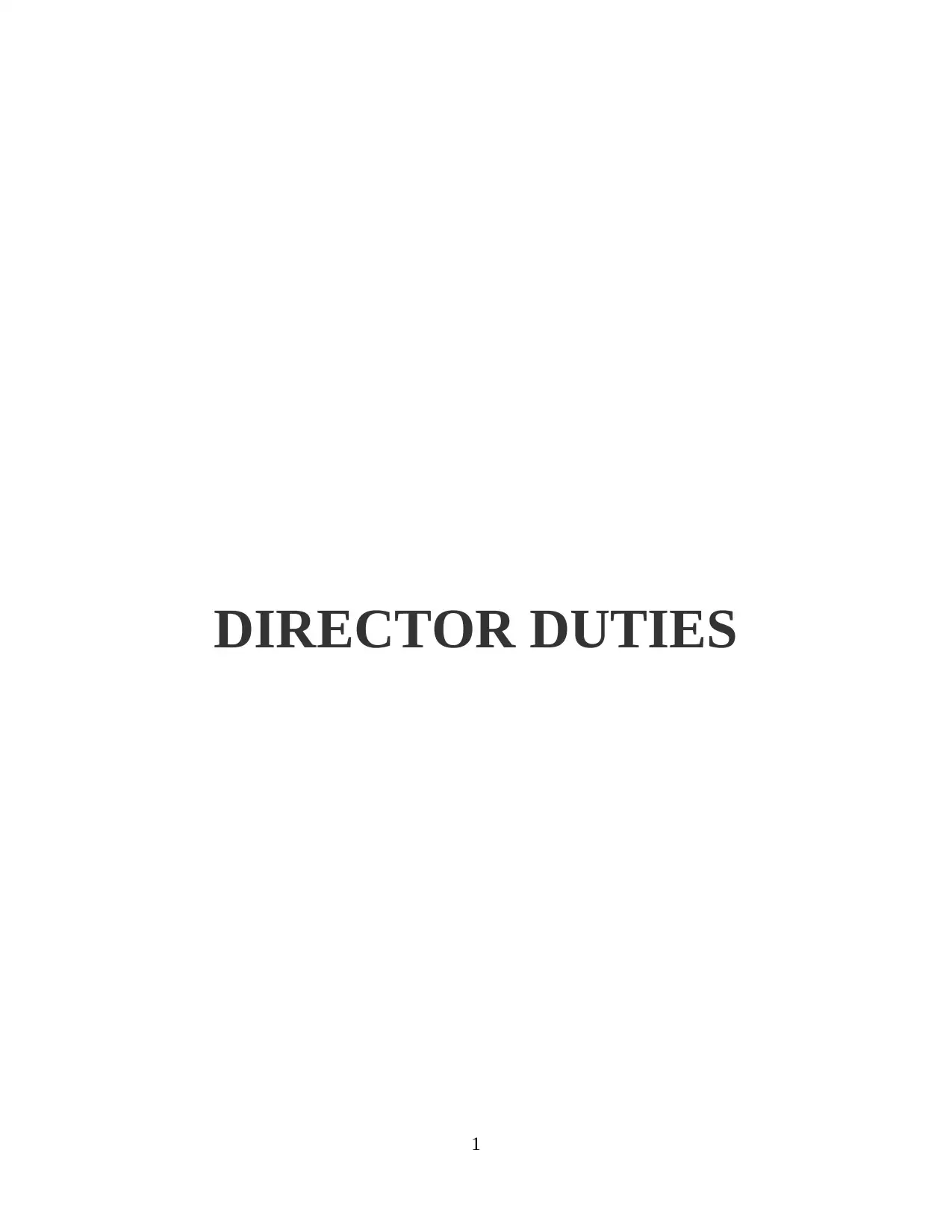
DIRECTOR DUTIES
1
1
Paraphrase This Document
Need a fresh take? Get an instant paraphrase of this document with our AI Paraphraser

TABLE OF CONTENTS
MAIN BODY...................................................................................................................................3
REFERENCES................................................................................................................................7
2
MAIN BODY...................................................................................................................................3
REFERENCES................................................................................................................................7
2
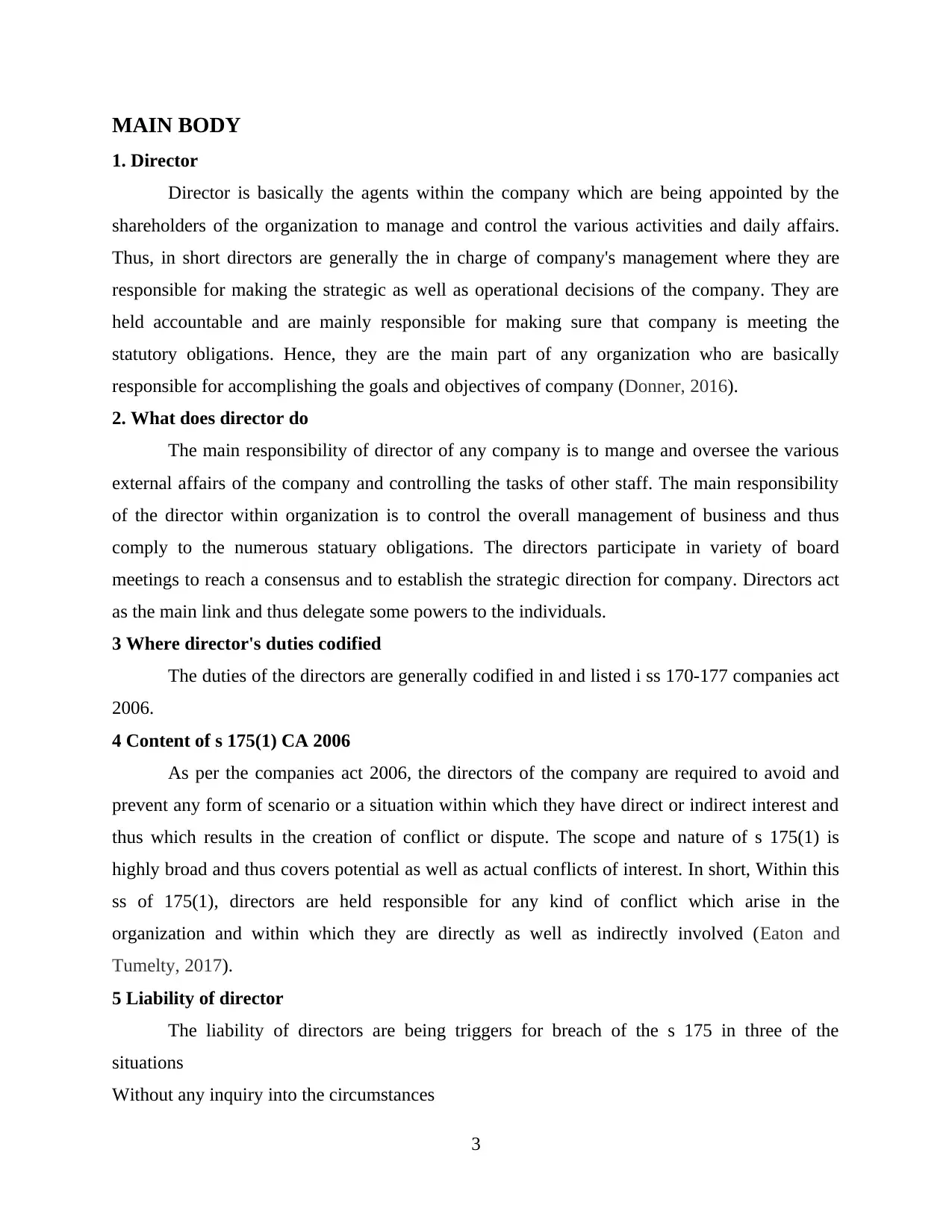
MAIN BODY
1. Director
Director is basically the agents within the company which are being appointed by the
shareholders of the organization to manage and control the various activities and daily affairs.
Thus, in short directors are generally the in charge of company's management where they are
responsible for making the strategic as well as operational decisions of the company. They are
held accountable and are mainly responsible for making sure that company is meeting the
statutory obligations. Hence, they are the main part of any organization who are basically
responsible for accomplishing the goals and objectives of company (Donner, 2016).
2. What does director do
The main responsibility of director of any company is to mange and oversee the various
external affairs of the company and controlling the tasks of other staff. The main responsibility
of the director within organization is to control the overall management of business and thus
comply to the numerous statuary obligations. The directors participate in variety of board
meetings to reach a consensus and to establish the strategic direction for company. Directors act
as the main link and thus delegate some powers to the individuals.
3 Where director's duties codified
The duties of the directors are generally codified in and listed i ss 170-177 companies act
2006.
4 Content of s 175(1) CA 2006
As per the companies act 2006, the directors of the company are required to avoid and
prevent any form of scenario or a situation within which they have direct or indirect interest and
thus which results in the creation of conflict or dispute. The scope and nature of s 175(1) is
highly broad and thus covers potential as well as actual conflicts of interest. In short, Within this
ss of 175(1), directors are held responsible for any kind of conflict which arise in the
organization and within which they are directly as well as indirectly involved (Eaton and
Tumelty, 2017).
5 Liability of director
The liability of directors are being triggers for breach of the s 175 in three of the
situations
Without any inquiry into the circumstances
3
1. Director
Director is basically the agents within the company which are being appointed by the
shareholders of the organization to manage and control the various activities and daily affairs.
Thus, in short directors are generally the in charge of company's management where they are
responsible for making the strategic as well as operational decisions of the company. They are
held accountable and are mainly responsible for making sure that company is meeting the
statutory obligations. Hence, they are the main part of any organization who are basically
responsible for accomplishing the goals and objectives of company (Donner, 2016).
2. What does director do
The main responsibility of director of any company is to mange and oversee the various
external affairs of the company and controlling the tasks of other staff. The main responsibility
of the director within organization is to control the overall management of business and thus
comply to the numerous statuary obligations. The directors participate in variety of board
meetings to reach a consensus and to establish the strategic direction for company. Directors act
as the main link and thus delegate some powers to the individuals.
3 Where director's duties codified
The duties of the directors are generally codified in and listed i ss 170-177 companies act
2006.
4 Content of s 175(1) CA 2006
As per the companies act 2006, the directors of the company are required to avoid and
prevent any form of scenario or a situation within which they have direct or indirect interest and
thus which results in the creation of conflict or dispute. The scope and nature of s 175(1) is
highly broad and thus covers potential as well as actual conflicts of interest. In short, Within this
ss of 175(1), directors are held responsible for any kind of conflict which arise in the
organization and within which they are directly as well as indirectly involved (Eaton and
Tumelty, 2017).
5 Liability of director
The liability of directors are being triggers for breach of the s 175 in three of the
situations
Without any inquiry into the circumstances
3
⊘ This is a preview!⊘
Do you want full access?
Subscribe today to unlock all pages.

Trusted by 1+ million students worldwide
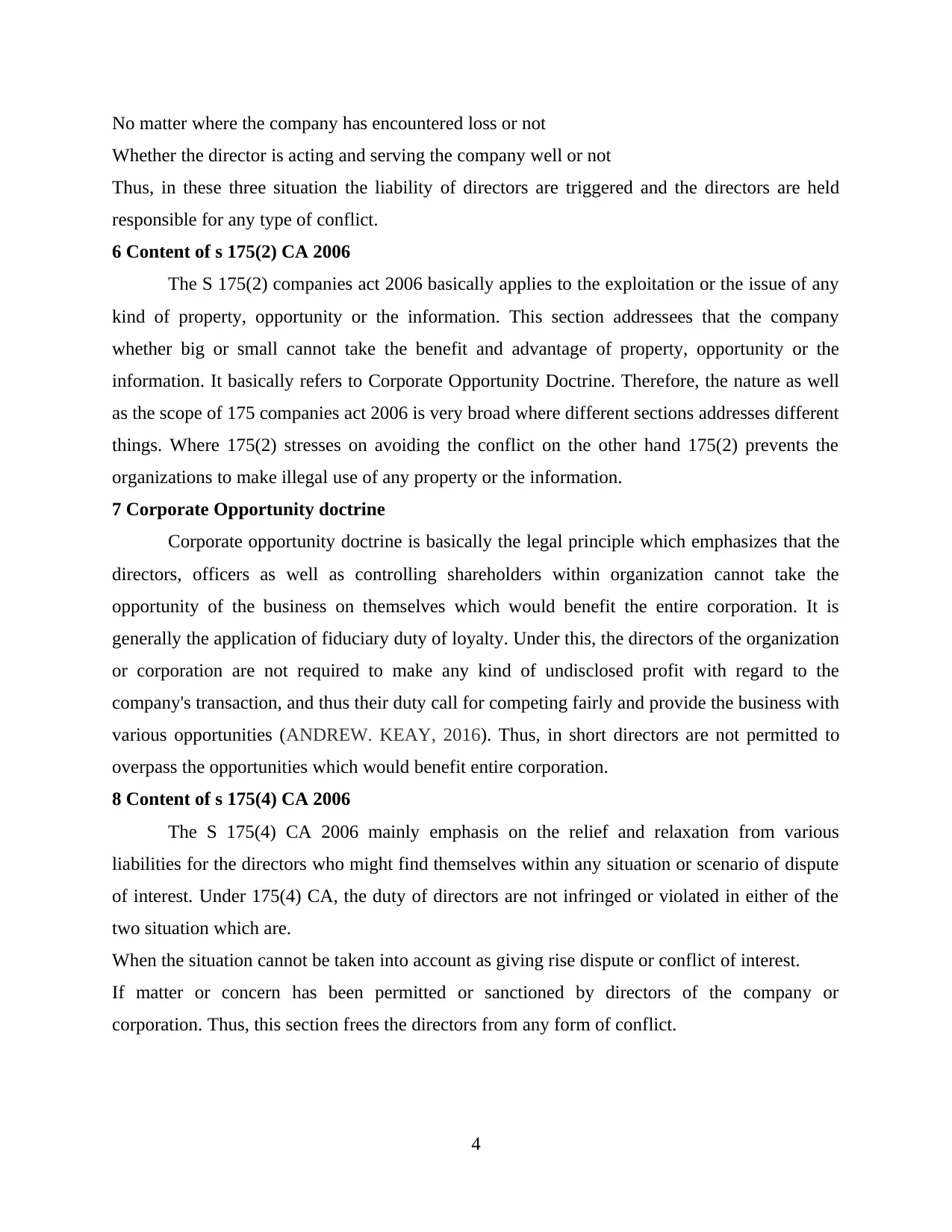
No matter where the company has encountered loss or not
Whether the director is acting and serving the company well or not
Thus, in these three situation the liability of directors are triggered and the directors are held
responsible for any type of conflict.
6 Content of s 175(2) CA 2006
The S 175(2) companies act 2006 basically applies to the exploitation or the issue of any
kind of property, opportunity or the information. This section addressees that the company
whether big or small cannot take the benefit and advantage of property, opportunity or the
information. It basically refers to Corporate Opportunity Doctrine. Therefore, the nature as well
as the scope of 175 companies act 2006 is very broad where different sections addresses different
things. Where 175(2) stresses on avoiding the conflict on the other hand 175(2) prevents the
organizations to make illegal use of any property or the information.
7 Corporate Opportunity doctrine
Corporate opportunity doctrine is basically the legal principle which emphasizes that the
directors, officers as well as controlling shareholders within organization cannot take the
opportunity of the business on themselves which would benefit the entire corporation. It is
generally the application of fiduciary duty of loyalty. Under this, the directors of the organization
or corporation are not required to make any kind of undisclosed profit with regard to the
company's transaction, and thus their duty call for competing fairly and provide the business with
various opportunities (ANDREW. KEAY, 2016). Thus, in short directors are not permitted to
overpass the opportunities which would benefit entire corporation.
8 Content of s 175(4) CA 2006
The S 175(4) CA 2006 mainly emphasis on the relief and relaxation from various
liabilities for the directors who might find themselves within any situation or scenario of dispute
of interest. Under 175(4) CA, the duty of directors are not infringed or violated in either of the
two situation which are.
When the situation cannot be taken into account as giving rise dispute or conflict of interest.
If matter or concern has been permitted or sanctioned by directors of the company or
corporation. Thus, this section frees the directors from any form of conflict.
4
Whether the director is acting and serving the company well or not
Thus, in these three situation the liability of directors are triggered and the directors are held
responsible for any type of conflict.
6 Content of s 175(2) CA 2006
The S 175(2) companies act 2006 basically applies to the exploitation or the issue of any
kind of property, opportunity or the information. This section addressees that the company
whether big or small cannot take the benefit and advantage of property, opportunity or the
information. It basically refers to Corporate Opportunity Doctrine. Therefore, the nature as well
as the scope of 175 companies act 2006 is very broad where different sections addresses different
things. Where 175(2) stresses on avoiding the conflict on the other hand 175(2) prevents the
organizations to make illegal use of any property or the information.
7 Corporate Opportunity doctrine
Corporate opportunity doctrine is basically the legal principle which emphasizes that the
directors, officers as well as controlling shareholders within organization cannot take the
opportunity of the business on themselves which would benefit the entire corporation. It is
generally the application of fiduciary duty of loyalty. Under this, the directors of the organization
or corporation are not required to make any kind of undisclosed profit with regard to the
company's transaction, and thus their duty call for competing fairly and provide the business with
various opportunities (ANDREW. KEAY, 2016). Thus, in short directors are not permitted to
overpass the opportunities which would benefit entire corporation.
8 Content of s 175(4) CA 2006
The S 175(4) CA 2006 mainly emphasis on the relief and relaxation from various
liabilities for the directors who might find themselves within any situation or scenario of dispute
of interest. Under 175(4) CA, the duty of directors are not infringed or violated in either of the
two situation which are.
When the situation cannot be taken into account as giving rise dispute or conflict of interest.
If matter or concern has been permitted or sanctioned by directors of the company or
corporation. Thus, this section frees the directors from any form of conflict.
4
Paraphrase This Document
Need a fresh take? Get an instant paraphrase of this document with our AI Paraphraser
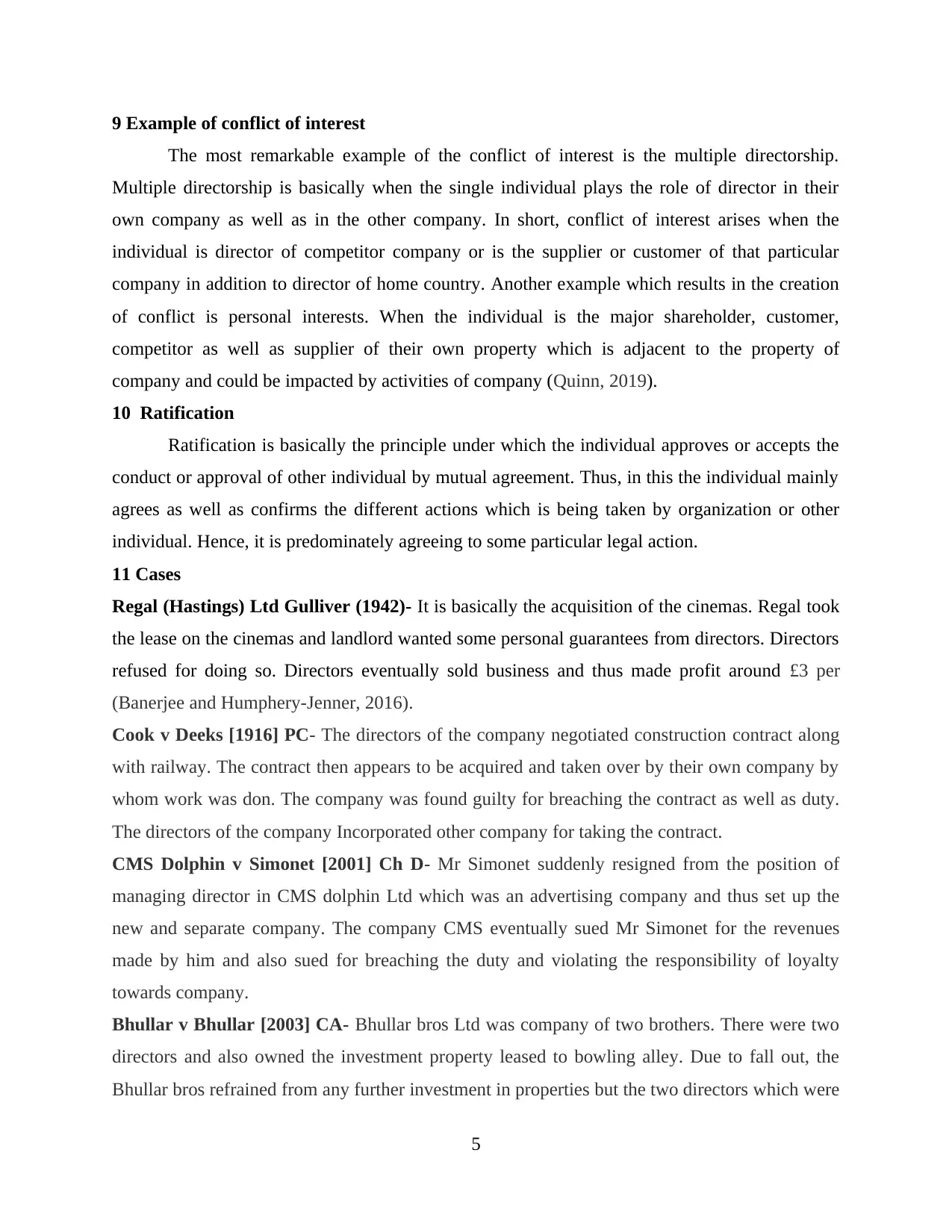
9 Example of conflict of interest
The most remarkable example of the conflict of interest is the multiple directorship.
Multiple directorship is basically when the single individual plays the role of director in their
own company as well as in the other company. In short, conflict of interest arises when the
individual is director of competitor company or is the supplier or customer of that particular
company in addition to director of home country. Another example which results in the creation
of conflict is personal interests. When the individual is the major shareholder, customer,
competitor as well as supplier of their own property which is adjacent to the property of
company and could be impacted by activities of company (Quinn, 2019).
10 Ratification
Ratification is basically the principle under which the individual approves or accepts the
conduct or approval of other individual by mutual agreement. Thus, in this the individual mainly
agrees as well as confirms the different actions which is being taken by organization or other
individual. Hence, it is predominately agreeing to some particular legal action.
11 Cases
Regal (Hastings) Ltd Gulliver (1942)- It is basically the acquisition of the cinemas. Regal took
the lease on the cinemas and landlord wanted some personal guarantees from directors. Directors
refused for doing so. Directors eventually sold business and thus made profit around £3 per
(Banerjee and Humphery-Jenner, 2016).
Cook v Deeks [1916] PC- The directors of the company negotiated construction contract along
with railway. The contract then appears to be acquired and taken over by their own company by
whom work was don. The company was found guilty for breaching the contract as well as duty.
The directors of the company Incorporated other company for taking the contract.
CMS Dolphin v Simonet [2001] Ch D- Mr Simonet suddenly resigned from the position of
managing director in CMS dolphin Ltd which was an advertising company and thus set up the
new and separate company. The company CMS eventually sued Mr Simonet for the revenues
made by him and also sued for breaching the duty and violating the responsibility of loyalty
towards company.
Bhullar v Bhullar [2003] CA- Bhullar bros Ltd was company of two brothers. There were two
directors and also owned the investment property leased to bowling alley. Due to fall out, the
Bhullar bros refrained from any further investment in properties but the two directors which were
5
The most remarkable example of the conflict of interest is the multiple directorship.
Multiple directorship is basically when the single individual plays the role of director in their
own company as well as in the other company. In short, conflict of interest arises when the
individual is director of competitor company or is the supplier or customer of that particular
company in addition to director of home country. Another example which results in the creation
of conflict is personal interests. When the individual is the major shareholder, customer,
competitor as well as supplier of their own property which is adjacent to the property of
company and could be impacted by activities of company (Quinn, 2019).
10 Ratification
Ratification is basically the principle under which the individual approves or accepts the
conduct or approval of other individual by mutual agreement. Thus, in this the individual mainly
agrees as well as confirms the different actions which is being taken by organization or other
individual. Hence, it is predominately agreeing to some particular legal action.
11 Cases
Regal (Hastings) Ltd Gulliver (1942)- It is basically the acquisition of the cinemas. Regal took
the lease on the cinemas and landlord wanted some personal guarantees from directors. Directors
refused for doing so. Directors eventually sold business and thus made profit around £3 per
(Banerjee and Humphery-Jenner, 2016).
Cook v Deeks [1916] PC- The directors of the company negotiated construction contract along
with railway. The contract then appears to be acquired and taken over by their own company by
whom work was don. The company was found guilty for breaching the contract as well as duty.
The directors of the company Incorporated other company for taking the contract.
CMS Dolphin v Simonet [2001] Ch D- Mr Simonet suddenly resigned from the position of
managing director in CMS dolphin Ltd which was an advertising company and thus set up the
new and separate company. The company CMS eventually sued Mr Simonet for the revenues
made by him and also sued for breaching the duty and violating the responsibility of loyalty
towards company.
Bhullar v Bhullar [2003] CA- Bhullar bros Ltd was company of two brothers. There were two
directors and also owned the investment property leased to bowling alley. Due to fall out, the
Bhullar bros refrained from any further investment in properties but the two directors which were
5
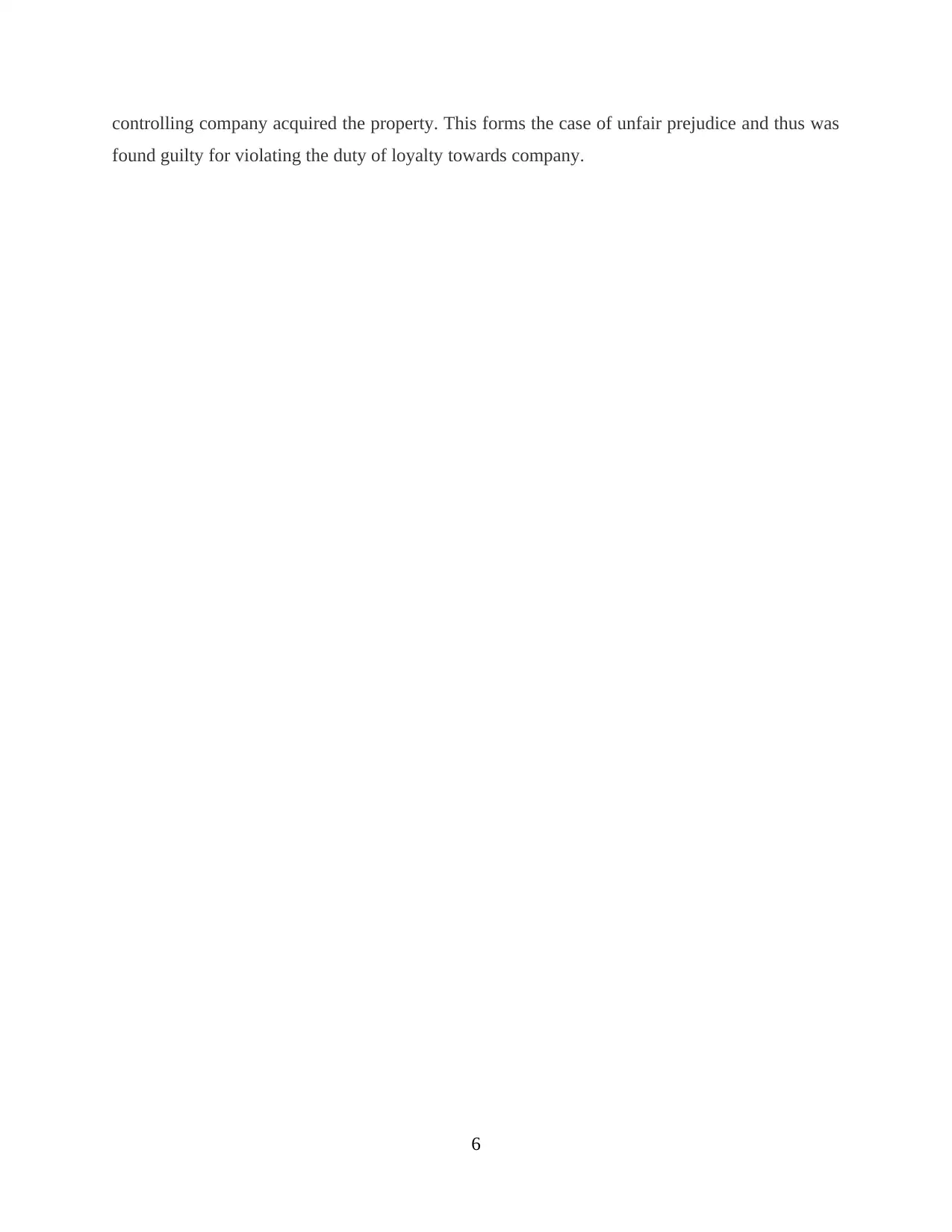
controlling company acquired the property. This forms the case of unfair prejudice and thus was
found guilty for violating the duty of loyalty towards company.
6
found guilty for violating the duty of loyalty towards company.
6
⊘ This is a preview!⊘
Do you want full access?
Subscribe today to unlock all pages.

Trusted by 1+ million students worldwide
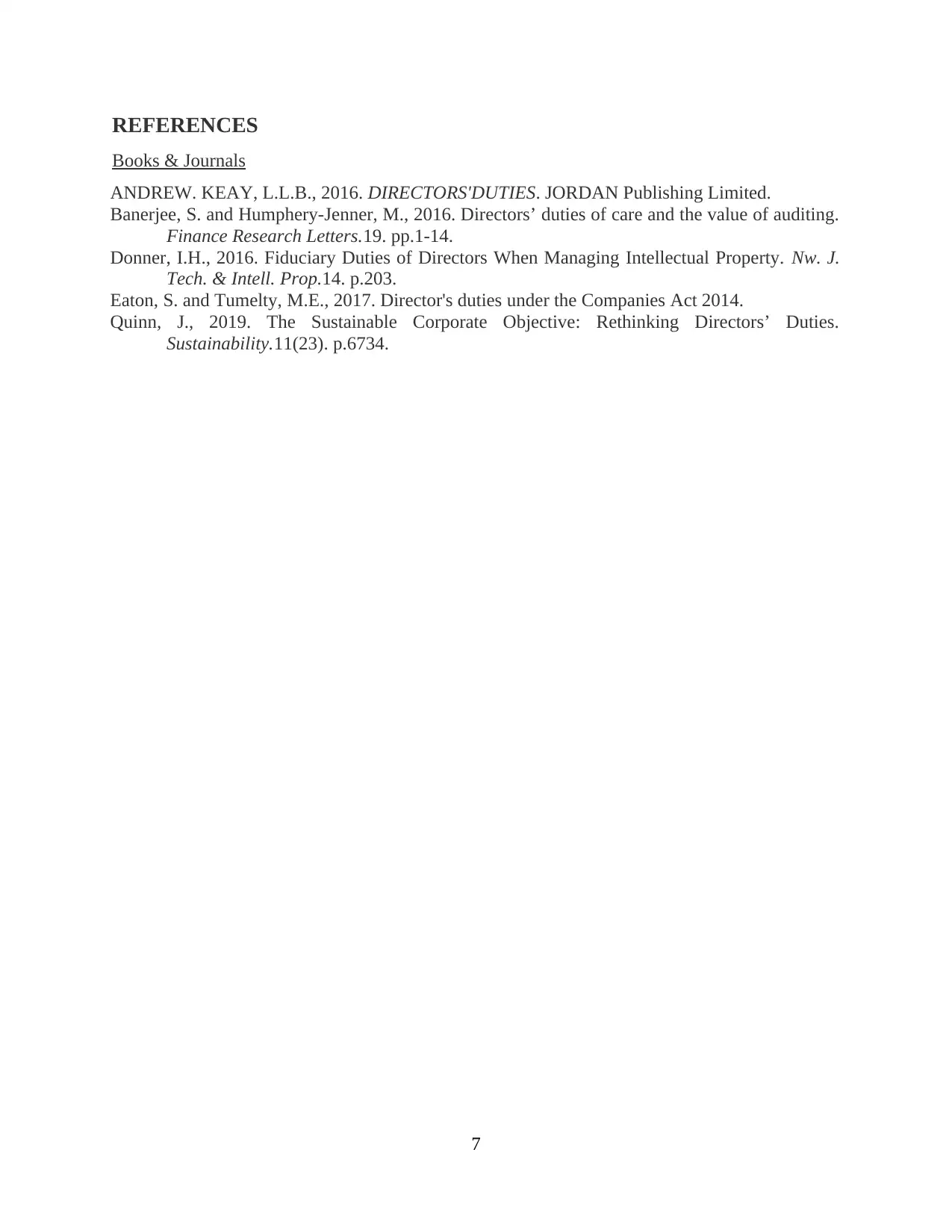
REFERENCES
Books & Journals
ANDREW. KEAY, L.L.B., 2016. DIRECTORS'DUTIES. JORDAN Publishing Limited.
Banerjee, S. and Humphery-Jenner, M., 2016. Directors’ duties of care and the value of auditing.
Finance Research Letters.19. pp.1-14.
Donner, I.H., 2016. Fiduciary Duties of Directors When Managing Intellectual Property. Nw. J.
Tech. & Intell. Prop.14. p.203.
Eaton, S. and Tumelty, M.E., 2017. Director's duties under the Companies Act 2014.
Quinn, J., 2019. The Sustainable Corporate Objective: Rethinking Directors’ Duties.
Sustainability.11(23). p.6734.
7
Books & Journals
ANDREW. KEAY, L.L.B., 2016. DIRECTORS'DUTIES. JORDAN Publishing Limited.
Banerjee, S. and Humphery-Jenner, M., 2016. Directors’ duties of care and the value of auditing.
Finance Research Letters.19. pp.1-14.
Donner, I.H., 2016. Fiduciary Duties of Directors When Managing Intellectual Property. Nw. J.
Tech. & Intell. Prop.14. p.203.
Eaton, S. and Tumelty, M.E., 2017. Director's duties under the Companies Act 2014.
Quinn, J., 2019. The Sustainable Corporate Objective: Rethinking Directors’ Duties.
Sustainability.11(23). p.6734.
7
Paraphrase This Document
Need a fresh take? Get an instant paraphrase of this document with our AI Paraphraser

8

9
⊘ This is a preview!⊘
Do you want full access?
Subscribe today to unlock all pages.

Trusted by 1+ million students worldwide
1 out of 9